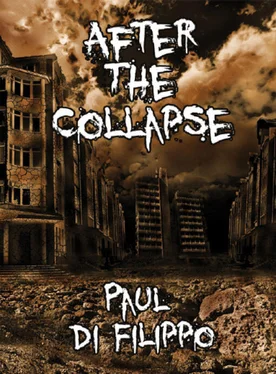As if I ever could.
Hannah Lawes resumed her programmed spiel. “All right, let’s talk about your options now….”
For the next few minutes, she outlined the various programs and handouts and incentives that the government and private charities and NGO’s had lined up for the victims of the disaster. Somehow, none of the choices really matched my dreams and expectations engendered by the all-consuming catastrophe. All of them involved relocating to some other part of the country, leaving behind the shattered chaos of the East Coast. And that was something I just wasn’t ready for yet, inevitable as such a move was.
And besides, choosing any one particular path would have meant foregoing all the others. Leaving this indeterminate interzone of infinite possibility would lock me into a new life that might be better than my old one, but would still be fixed, crystallized, frozen into place.
“Do I have to decide right now?”
“No, no, of course not.”
I stood up to go, and Hannah Lawes added, “But you realize, naturally, that this camp was never intended as a long-term residence. It’s only transitional, and will be closed down at some point not too far in the future.”
“Yeah, sure,” I said. “We’re all just passing through. I get it.”
I left then and made way for the next person waiting in line.
* * * *
The tents of Femaville 29 were arranged along five main dirt avenues, each as wide as a city boulevard. Expressing the same ingenuity that had dubbed our whole encampment, the avenues were labeled A, B, C, D and E. Every three tents, a numbered cross-street occurred. The tents of one avenue backed up against the tents of the adjacent avenue, so that a cross-block was two tents wide. The land where Femaville 29 was pitched was flat and treeless and covered in newly mowed weeds and grasses. Beyond the borders of our village stretched a mix of forest, scrubby fields and swamp, eventually giving way to rolling hills. The nearest real town was about ten miles away, and there was no regular transportation there other than by foot.
As I walked up Avenue D toward my tent (D-30), I encountered dozens of my fellow refugees who were finished with the intake process. Only two days had passed since the majority of us had been ferried here in commandeered school buses. People—the adults, anyhow—were still busy exchanging their stories—thrilling, horrific or mundane—about how they had escaped the tsunami or dealt with the aftermath.
I didn’t have any interest in repeating my tale, so I didn’t join in any such conversations.
As for the children, they seemed mostly to have flexibly put behind them all the trauma they must have witnessed. Reveling in their present freedom from boring routine, they raced up and down the avenues in squealing packs.
Already, the seasonally withered grass of the avenues was becoming dusty ruts. Just days old, this temporary village, I could feel, was already beginning to lose its freshness and ambiance of novelty.
Under the unseasonably warm sun, I began to sweat. A cold beer would have tasted good right now. But the rules of Femaville 29 prohibited alcohol.
I reached my tent and went inside.
My randomly assigned roommate lay on his bunk. Given how the disaster had shattered and stirred the neighborhoods of the city, it was amazing that I actually knew the fellow from before. I had encountered no one else yet in the camp who was familiar to me. And out of all my old friends and acquaintances and co-workers, Ethan Duplessix would have been my last choice to be reunited with.
Ethan was a fat, bristled slob with a long criminal record of petty theft, fraud and advanced mopery. His personal grooming habits were so atrocious that he had emerged from the disaster more or less in the same condition he entered it, unlike the rest of the survivors who had gone from well-groomed to uncommonly bedraggled and smelly.
Ethan and I had crossed paths often, and I had locked him up more times than I could count. (When the tsunami struck, he had been amazingly free of outstanding charges.) But the new circumstances of our lives, including Ethan’s knowledge of how I had “retired” from the force, placed us now on a different footing.
“Hey, Hedges, how’d it go? They got you a new job yet? Maybe security guard at a kindergarten!”
I didn’t bother replying, but just flopped down on my bunk. Ethan chuckled meanly at his own paltry wit for a while, but when I didn’t respond, he eventually fell silent, his attentions taken up by a tattered copy of Maxim .
I closed my eyes and drowsed for a while, until I got hungry. Then I got up and went to the refectory.
That day they were serving hamburgers and fries for the third day in a row. Mickey Dee’s seemed to have gotten a lock on the contract to supply the camp. I took mine to an empty table. Head bowed, halfway through my meal, I sensed someone standing beside me.
The woman’s curly black hair descended to her shoulders in a tumbled mass. Her face resembled a cameo in its alabaster fineness.
“Mind if I sit here?” she said.
“Sure. I mean, go for it.”
The simple but primordial movements of her legs swinging over the bench seat and her ass settling down awakened emotions in me that had been absent since Calley’s abrupt leave-taking.
“Nia Horsley. Used to live over on Garden Parkway.”
“Nice district.”
Nia snorted, a surprisingly enjoyable sound. “Yeah, once.”
“I never got over there much. Worked in East Grove. Had an apartment on Oakeshott.”
“And what would the name on your doorbell have been?”
“Oh, sorry. Parrish Hedges.”
“Pleased to meet you, Parrish.”
We shook hands. Hers was small but strong, enshelled in mine like a pearl.
For the next two hours, through two more shifts of diners coming and going, we talked, exchanging condensed life stories, right up to the day of disaster and down to our arrival at Femaville 29. Maybe the accounts were edited for maximum appeal, but I intuitively felt she and I were being honest nonetheless. When the refectory workers finally shooed us out in order to clean up for supper, I felt as if I had known Nia for two weeks, two months, two years—
She must have felt the same. As we strolled away down Avenue B, she held my hand.
“I don’t have a roomie in my tent.”
“Oh?”
“It’s just me and my daughter. Luck of the draw, I guess.”
“I like kids. Never had any, but I like ‘em.”
“Her name’s Izzy. Short for Isabel. You’ll get to meet her. But maybe not just yet.”
“How come?”
“She’s made a lot of new friends. They stay out all day, playing on the edge of the camp. Some kind of weird new game they invented.”
“We could go check up on her, and I could say hello.”
Nia squeezed my hand. “Maybe not right this minute.”
* * * *
I got to meet Izzy the day after Nia and I slept together. I suppose I could’ve hung around till Izzy came home for supper, but the intimacy with Nia, after such a desert of personal isolation, left me feeling a little disoriented and pressured. So I made a polite excuse for my departure, which Nia accepted with good grace, and arranged to meet mother and daughter for breakfast.
Izzy bounced into the refectory ahead of her mother. She was seven or eight, long-limbed and fair-haired in contrast to her mother’s compact, raven-haired paleness, but sharing Nia’s high-cheeked bone structure. I conjectured backward to a gangly blond father.
The little girl zeroed in on me somehow out of the whole busy dining hall, racing up to where I sat, only to slam on the brakes with alarming precipitousness.
“You’re Mr. Hedges!” she informed me and the world.
Читать дальше










